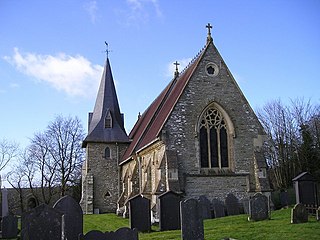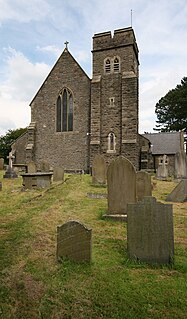Related Research Articles
Ceredig ap Cunedda, was king of Ceredigion in Wales.

Saint Winifred was a Welsh virgin martyr of the 7th century. Her story was celebrated as early as the 8th century, but became popular in England in the 12th, when her hagiography was first written down.
Cadfan ap Iago was King of Gwynedd. Little is known of the history of Gwynedd from this period, and information about Cadfan and his reign is minimal.

Brychan Brycheiniog was a legendary 5th-century king of Brycheiniog in Mid Wales.

Saint Cynllo is a British saint, who lived in the late 5th and early 6th centuries, generally described as a brother of Saint Teilo. Cynllo was known for "...the sanctity of his life and the austerity of his manners."

Dubricius or Dubric was a 6th-century British ecclesiastic venerated as a saint. He was the evangelist of Ergyng and much of south-east Wales.

Saint Carantoc, also anglicized as Carantock, Carannog and by other spellings, was a 6th-century abbot, confessor, and saint in Wales and the West Country. He is credited with founding Llangrannog, Ceredigion, Wales and St Carantoc's Church, Crantock. His name is listed amongst the Cornish Saints. Carantoc's is one of five insular saints' lives and two Breton ones that mention Arthur in contexts that may be independent of Geoffrey of Monmouth's Historia Regum Britanniae. He is venerated by the Eastern Orthodox Church and Roman Catholic Church.

Saint Afan of Builth was an early 6th-century Welsh bishop, martyr, and saint. His feast day is generally placed on 17 November, although the Demetian Calendar formerly used in southern Wales placed it on the 16th; it is no longer observed by either the Anglican or Catholic church in Wales.
Nidan was a Welsh priest and, according to some sources, a bishop, in the 6th and 7th centuries. He is now commemorated as a saint. He was the confessor for the monastery headed by St Seiriol at Penmon, and established a church at what is now known as Llanidan, which are both places on the Welsh island of Anglesey. He is the patron saint of two churches in Anglesey: St Nidan's Church, Llanidan, built in the 19th century, and its medieval predecessor, the Old Church of St Nidan, Llanidan. Midmar Old Kirk in Aberdeenshire, Scotland, is also dedicated to him: Nidan is said to have helped to establish Christianity in that area as a companion of St Kentigern. St Nidan's, Llanidan, has a reliquary dating from the 14th or 16th century, which is said to house his relics.

St Cristiolus's Church, Llangristiolus is a medieval church near the village of Llangristiolus, in Anglesey, north Wales. The village, about 1 mile (1.6 km) from the building, takes its name from the church. Reputedly founded by St Cristiolus in 610, the present building dates from the 12th and 13th centuries. Alterations were made in the 16th century, when the large east window in Perpendicular style was added to the chancel – a window which has been described by one guide to the buildings of north Wales as "almost too big to fit" in the wall. Some restoration work took place in the mid-19th century, when further windows were added and the chancel largely rebuilt.
Elaeth was a Christian king and poet in Britain in the 6th century who is venerated as a saint. After losing his territory in the north of Britain, he retreated to Anglesey, north Wales, where he lived at a monastery run by St Seiriol at Penmon. Some religious poetry is attributed to him, as is the foundation of St Eleth's Church, Amlwch, also in Anglesey.

Merthyr Dyfan or Dyfan is a northeastern suburb of Barry in the Vale of Glamorgan, in south Wales, formerly an independent medieval village. It is also an ecclesiastical parish and a formal electoral ward of the Vale of Glamorgan. It borders Colcot to the west, Buttrills to the southwest and Gibbonsdown to the southeast. Its main roads are Merthyr Dyfan Road, a hilly road leading down from the A4050 road which leads into Wenvoe and Cardiff; and Skomer Road which separates it from Gibbonsdown and eventually also leads to the A4050 road. Merthyr Dyfan contains an old parish church, Barry Rugby Club, Bryn Hafren Comprehensive School and the Master Mariner Pub and Holm View Leisure Centre, although the last two could be considered to be in northern Gibbonsdown.

The Bishop of St Davids is the ordinary of the Church in Wales Diocese of St Davids.

Saint Teilo, also known by his Cornish name Eliud, was a British Christian monk, bishop, and founder of monasteries and churches. He was from Penalun (Penally) near Tenby in Pembrokeshire, south Wales.
A clas was a native Christian church in early medieval Wales. Unlike later Norman monasteries, which were made up of a main religious building supported by several smaller buildings, such as cloisters and kitchens, a clas was normally a single building. The building was run by a community of clergy and headed by an abod. Clasau were autonomous and were administered locally.
Cyllin was a legendary, and possibly historical British king of the 1st century AD, early Christian saint and the last pendragon of Great Britain. His existence is based on very limited evidence. Richard Williams Morgan claimed that a reference to him as a son of Caratacus was found in the family records of Iestyn ab Gwrgant and used this as evidence of early entry of Christianity to Britain;
Cyllin ab Caradog, a wise and just king. In his days many of the Cymry embraced the faith in Christ through the teaching of the saints of Cor-Eurgain, and many godly men from the countries of Greece and Rome were in Cambria. He first of the Cymry gave infants names; for before, names were not given except to adults, and then from something characteristic in their bodies, minds, or manners.

Saint Eigen, Eurgen, Eurgain or Eurgan was the legendary, and possibly historical first female Christian saint among the Britons. Her name has doubtfully been linked to two Welsh churches and is found in manuscripts from the collection of Iolo Morganwg making historical evidence of her existence dubious and limited.

Fagan, also known by other names including Fugatius, was a legendary 2nd-century Welsh bishop and saint, said to have been sent by the pope to answer King Lucius's request for baptism and conversion to Christianity. Together with his companion St Deruvian, he was sometimes reckoned as the apostle of Britain.

Deruvian, also known by several other names including Damian, was a possibly legendary 2nd-century bishop and saint, said to have been sent by the pope to answer King Lucius's request for baptism and conversion to Christianity. Together with his companion St Fagan, he was sometimes reckoned as the apostle of Britain. King Lucius's letter may represent earlier traditions but does not appear in surviving sources before the 6th century; the names of the bishops sent to him does not appear in sources older than the early 12th century, when their story was used to support the independence of the bishops of St Davids in Wales and the antiquity of the Glastonbury Abbey in England. The story became widely known following its appearance in Geoffrey of Monmouth's History of the Kings of Britain. This was influential for centuries and its account of SS Fagan and Deruvian was used during the English Reformation to support the claims of both the Catholics and Protestants. Christianity was well-established in Roman Britain by the third century. Some scholars therefore argue the stories preserve a more modest account of the conversion of a Romano-British chieftain, possibly by Roman emissaries by these names.
Isfael or Ismael, often anglicized as Ishmael, was a 6th-century medieval Welsh bishop of Rhos and saint. He was allegedly also a Breton prince of Armorica.
References
- 1 2 Breverton, T. D. (2000). The Book of Welsh Saints. Glyndwyr Publishing. p. 221. ISBN 1-903529-01-8.
- ↑ Dunbar, Agnes Baillie Cunninghame (1904). A Dictionary of Saintly Women, Vol. 1. London: Bell. p. 253.
- ↑ Rees, Rice (1836). An essay on the Welsh saints or the primitive Christians. London: Rees, Orme, Brown, Green, and Longman. p. 302.